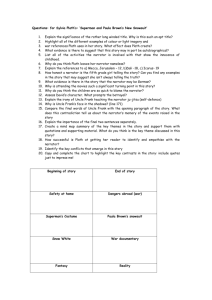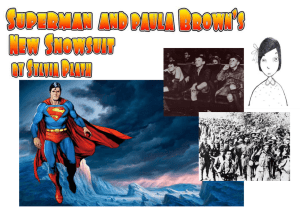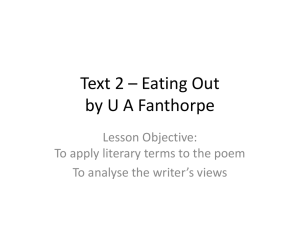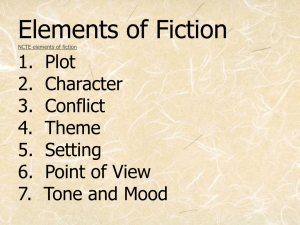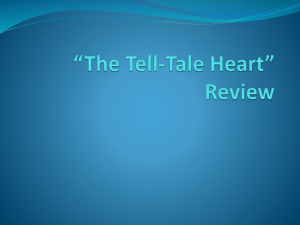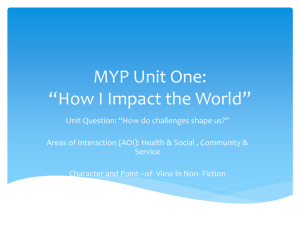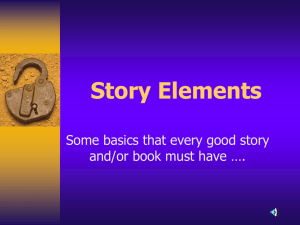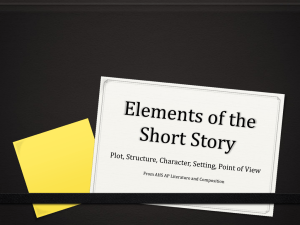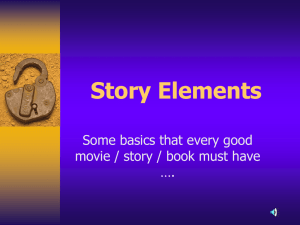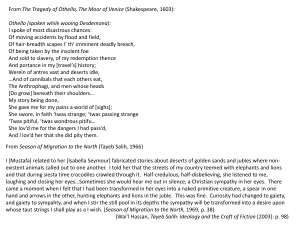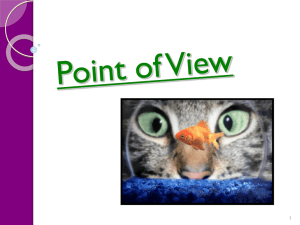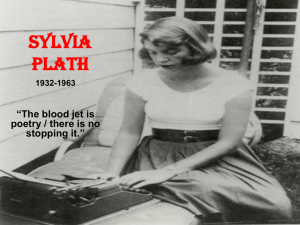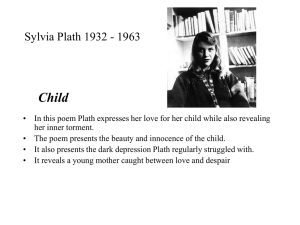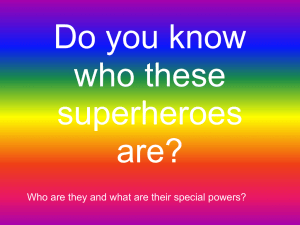Superman and Paula Brown Opposites
advertisement
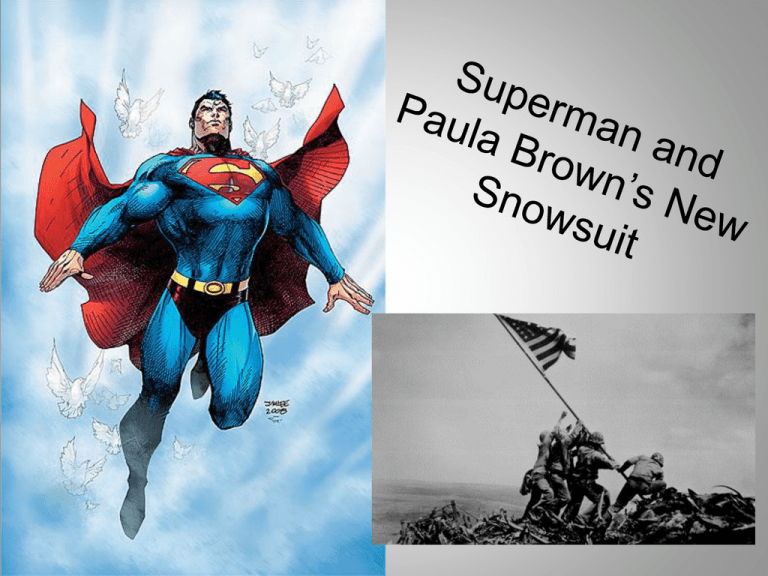
Title • Pick out the key words used in the title. • Think about and mindmap the connotations of these words. • How do you think that they might feature in the story? The Author • Sylvia Plath is most well known for her poetry, which was published in two volumes, Colossus (1960) and Ariel (1965), published posthumously (after the writer’s death). • Her novel The Bell Jar (1966) has echoes of her own life, as it records a young woman’s descent into mental illness and suicidal tendencies. Sylvia Plath was born in 1932 near Boston Massachussetts. • As an American student at Cambridge University she met Ted Hughes, whom she married in 1956, though they later separated. In 1963 Sylvia Plath took her own life. For many years Ted Hughes refused to comment on their relationship, but shortly before his death, in 1998, he published a series of poems on the subject in The Birthday Letters. Annotation & Comprehension 1. 2. 3. 4. 5. 6. 7. 8. 9. 10. 11. 12. 13. What method of narration is used by Plath? Why is the method of narration particularly important in this story? Other than Superman, what is used to represent the narrator’s fantasies in the first part of the story? Find a quotation to illustrate this. What role does Superman play in the first part of the story? What is the connection between Superman and Uncle Frank? Why does the narrator stop thinking about Superman? Find a quotation to illustrate this. List five things about the war which are mentioned in the story. What does the war represent in the story? What is the weather like on the day of the tag game? What is the significance of this? Why do you think Paula Brown blames the narrator for ruining her snowsuit? Do all the children know that the narrator did not push Paula? Are they perhaps unsure of what really happened? Try to find evidence for your answer. Your Task • Use the images to decide what opposites that Plath uses to explore ideas within the story. • Decide what these contrasting ideas are. • Explain why you think that Plath has included them in the story. • Use the sheet to match opposite quotations to explanations. Light and Dark • Throughout the story imagery of light and dark is used to represent the different ideas and feelings that the narrator has about the world around her. • With two different highlighters pick out examples of light imagery and secondly look for examples of dark imagery. Light • “I can recall the changing colours of those days, clear and definite as a pattern seen through a kaleidoscope.” P1 • “I used to kneel by the west window of my room and look over to the lights of Boston that blazed and blinked far off across the darkening water. The sunset flaunted its pink flag across the airport.” P1 • “The flashing red and green light that rose and set in the sky like shooting stars.” P1 • “Those were the days of my technicolour dreams” P1 • “He used to come roaring by in his shining blue suit” P1 • “…toward the bright squares of light in the windows that were home.” P3 • “Candles were set on the white linen tablecloth and miniature flames flickered in the silver and the glasses. P4 Dark “Some of the little children in the lower grades would cry because it was dark in the cellar, with only the bare ceiling lights on cold black stone.” P2 “No matter how hard I thought of superman before I went to sleep, no crusading blue figure came roaring down in heavenly anger to smash the yellow men who invaded my dreams.” P3 “Saturday was bitterly cold and the skies were grey and blurred with the treat of snow” P3 “The dull green light of late afternoon came closing down on us, cold and final as a window blind.”P3 “I began to run in the cold raw evening…” P3 “The staircase to the second floor was dark, but I went down the long hall to my room without turning on the light switch and shut the door. A small unripe moon was shafting squares of greenish light along the floor and the windowpanes were fringed with frost.” P4 “I lay there alone in the bed feeling the black shadow creeping up the underside of the world like a flood tide. Nothing held, nothing was left. The silver airplanes and the capes all dissolved and vanished, wiped away like the crude drawings of a child in coloured chalk from the colossal blackboard of the dark.” P4 • Point in context – The narrators childhood innocence and fascination with the airport can be seen from the beginning of the story as she describes the airport: • Example – “The sunset flaunted its pink flag above the airport…I marvelled at the morning beacons on the runway…the flashing red and green lights that rose and set in the sky in shooting stars.” • Explanation – Here Plath uses language to reflect the persona’s innocence. Words such as “marvelled” emphasise her sheer amazement at the planes as she has a fixation with flight. The use of the bright colours “pink”, “green” and “red” here are also very effective. There are vibrant and childlike and the reference to the being like “shooting stars” gives them a magical quality that illustrates how vivid the young narrators imagination is. • Personal Evaluation - This helps the reader relate to and picture the narrator because the sheer scale and colour of things are often what we remember most about our own childhood. The innocence and fascination with flying id further expressed by her dreams of superman Structure - Ending • “I lay there alone in the bed feeling the black shadow creeping up the underside of the world like a flood tide. Nothing held, nothing was left. The silver airplanes and the capes all dissolved and vanished, wiped away like the crude drawings of a child in coloured chalk from the colossal blackboard of the dark. That was the year the war began, and the real world, and the difference. ” P4 • • • • • How is the ending made sinister? Why have things changed? What has changed? Why do you think that the writer repeats her opening sentence in the final lines? What does the narrator mean? Essay Task Write about a short story that explores the theme of fantasy versus reality. Why Superman? • He is the Man of Steel that appeared like a bolt from the blue. • Possessed powers normally held by angels. • He could fly, withstand any injury, and melt almost any substance with his heat vision. • He believed in truth an justice. He never lied, though kept things like his upbringing a secret. Setting in Time The narrator tells us directly that the events in the story take place in wartime. The opening of the story is the phrase: “The year war began…” Throughout the story there are reminders of the war: • Uncle Frank is “waiting to be drafted” (to join the armed services). • Sheldon pretends to be a Nazi, while his Uncle is a prisoner in Germany. • There is a war film showing with Snow White. • The narrator wins a prize for drawing the best Civil Defence signs. • As well as the references to the war, there are other details, which tell the reader the historical context. It is early enough for flying to be seen as exciting and mysterious. It is after the release of Snow White – Disney's first feature-length animation, from 1937. And it coincides with radio broadcasts of Superman adventures. Time in Narrator’s Life • We can also understand time in terms of a person's life, with its various stages. This story marks the end of childhood as a time of trust and innocence. • Adults are no longer powerful people who can make things right or save the narrator from trouble – they are seen to be as powerless as children. In fact here it is children who have more or less manipulated the adults into believing their version of events. • In childhood, time can be measured in school years, and the narrator does this, referring to the fifth grade, for example. We can see that she is small and light enough for Uncle Frank to swing her in the air (although he is very strong, so this may not tell us much). • Another way that the narrator signals a sense of time is by referring to the sports and games the children play (baseball, dodge-ball, Chinese tag). We see this also in the way Frank teaches her ju-jitsu and the way he addresses her “my favourite trooper” and “honey”. Setting in Place • The setting of the story is in the eastern USA, near Boston (which is mentioned by name). Although the USA has entered the war, it is being fought far away in the Pacific and Europe. • The children learn about Civil Defence but there is no hint that the war will interfere with their security. The real dangers come from within themselves. Essay Help Tasks • Peer assess your partners introduction. • Now look at the exemplar essay and as a group try to piece it together on the paper provided. Write down: • What you think the essay task was? • Whether they have used PEEPS effectively. • What you would improve? • What you think they have done successfully? Now as a group think about the things you would include in your essay as a response to your essay task.
